Belkin F5D7230E Wireless G Router User Manual P74559 G F5D7230 4 manual indd
Belkin International, Inc. Wireless G Router P74559 G F5D7230 4 manual indd
Belkin >
Contents
- 1. Users Manual 1
- 2. Users Manual 2
- 3. Users Manual 3
Users Manual 3
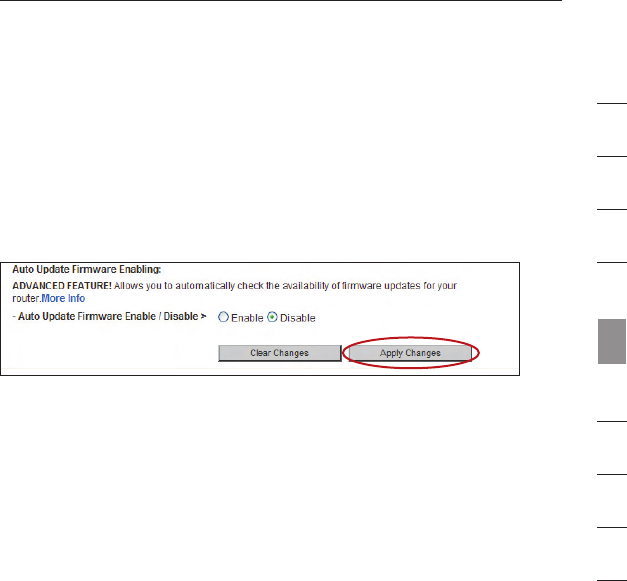
9190
9190
Using the Web-Based Advanced User Interface
section
1
9
2
3
4
5
6
7
8
10
Enabling/Disabling Auto Firmware Update
This innovation provides the Router with the built-in capability to automatically
check for a new version of firmware and alert you that the new firmware
is available. When you log into the Router’s Web-Based Advanced User
Interface, the Router will perform a check to see if new firmware is available.
If so, you will be notified. You can choose to download the new version or
ignore it. The Router ships with this feature enabled. If you want to disable it,
select “Disable” and click “Apply Changes”.
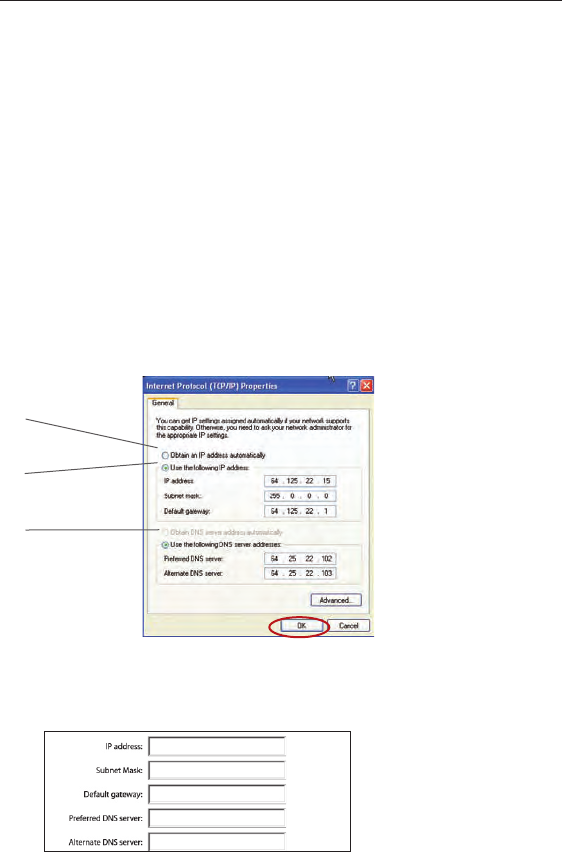
92
Manually Configuring Network Settings
92
In order for your computer to properly communicate with your Router, you will need
to change your PC’s TCP/IP settings to DHCP.
Manually Configuring Network Adapters in Windows 2000, NT, XP, or Vista
1. Click “Start”, “Settings”, then “Control Panel”.
2. Double-click on the “Network and dial-up connections” icon (Windows
2000) or the “Network” icon (Windows XP or Vista).
3. Right-click on the “Local Area Connection” associated with your
network adapter and select “Properties” from the drop-down menu.
4. In the “Local Area Connection Properties” window, click “Internet
Protocol (TCP/IP)” and click the “Properties” button. The following
screen will appear:
(1)
(2)
(3)
5. If “Use the following IP address” (2) is selected, your Router will need to
be set up for a static IP connection type. Write the address information in
the table below. You will need to enter this information into the Router.
6. If not already selected, select “Obtain an IP address automatically” (1)
and “Obtain DNS server address automatically” (3). Click “OK”.
Your network adapter(s) are now configured for use with the Router.
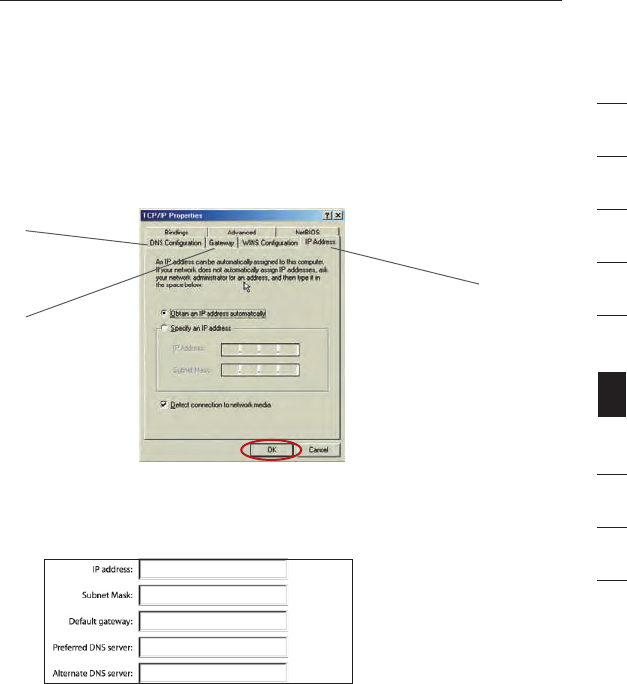
1
2
3
4
5
6
9
8
10
9392
9392
Manually Configuring Network Settings
section
7
Manually Configuring Network Adapters in Windows 98SE or Me
1. Right-click on “My Network Neighborhood” and select
“Properties” from the drop-down menu.
2. Select “TCP/IP -> settings” for your installed network adapter.
You will see the following window.
(1)
(2)
(3)
3. If “Specify an IP address” is selected, your Router will need
to be set up for a static IP connection type. Write the address
information in the table below. You will need to enter this
information into the Router.
4. Write in the IP address and subnet mask from the “IP Address”
tab (3).
5. Click the “Gateway” tab (2). Write the gateway address down in
the chart.
6. Click the “DNS Configuration” tab (1). Write the DNS
address(es) in the chart.
7. If not already selected, select “Obtain IP address automatically”
in the “IP Address” tab. Click “OK”.
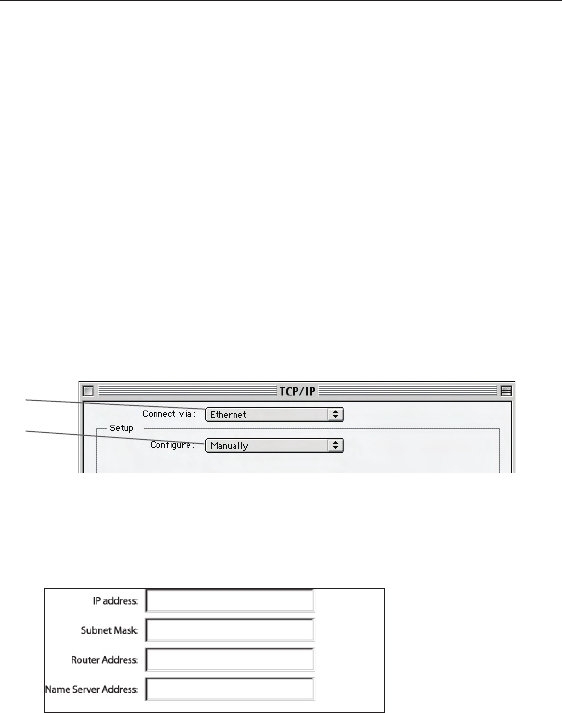
94
Manually Configuring Network Settings
94
Restart the computer. When the computer restarts, your network
adapter(s) are now configured for use with the Router.
Set up the computer that is connected to the cable or DSL modem FIRST
using these steps. You can also use these steps to add computers to your
Router after the Router has been set up to connect to the Internet.
Manually Configuring Network Adapters in Mac OS up to 9.x
In order for your computer to properly communicate with your Router, you
will need to change your Mac computer’s TCP/IP settings to DHCP.
1. Pull down the Apple menu. Select “Control Panels” and
select “TCP/IP”.
2. You will see the TCP/IP control panel. Select “Ethernet Built-In” or
“Ethernet” in the “Connect via:” drop-down menu (1).
(1)
(2)
3. Next to “Configure” (2), if “Manually” is selected, your Router will
need to be set up for a static IP connection type. Write the address
information in the table below. You will need to enter this information
into the Router.
4. If not already set, at “Configure:”, choose “Using DHCP
Server”. This will tell the computer to obtain an IP address
from the Router.
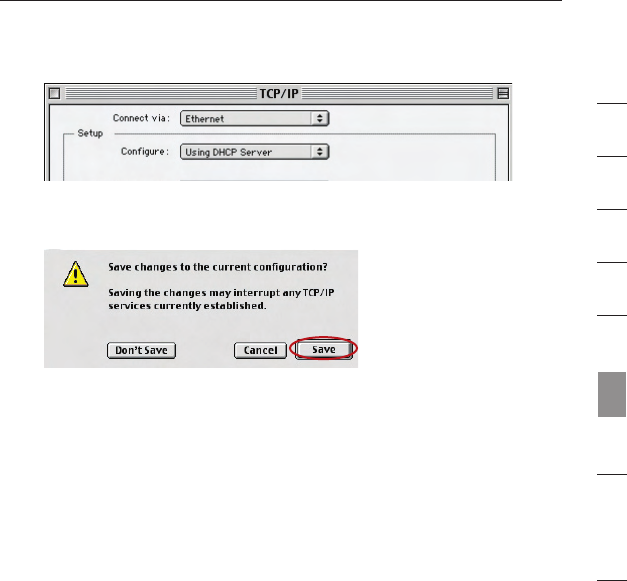
9594
9594
Manually Configuring Network Settings
section
1
9
2
3
4
5
6
7
8
10
5. Close the window. If you made any changes, the following
window will appear. Click “Save”.
Restart the computer. When the computer restarts, your network
settings are now configured for use with the Router.
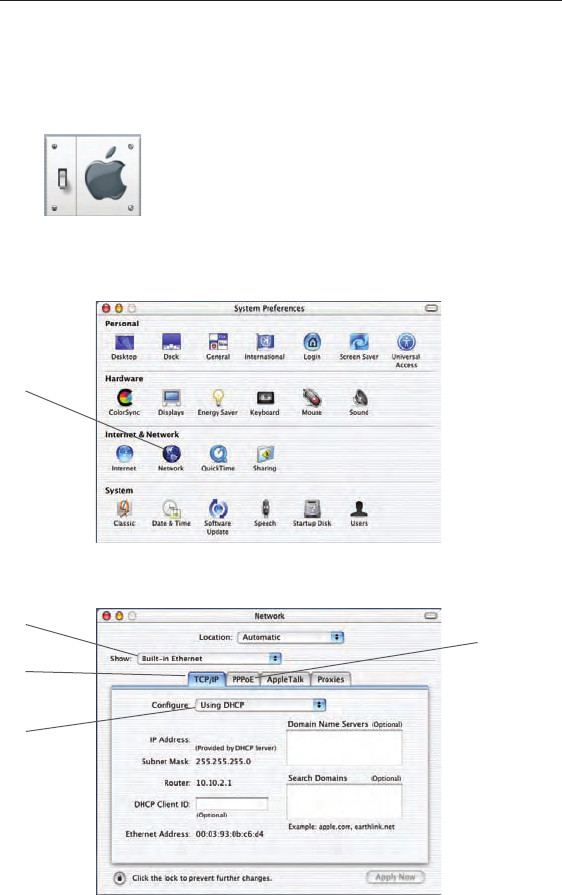
96
Manually Configuring Network Settings
96
Manually Configuring Network Adapters in Mac OS X
1. Click on the “System Preferences” icon.
2. Select “Network” (1) from the “System Preferences” menu.
(1)
3. Select “Built-in Ethernet” (2) next to “Show” in the Network menu.
(2)
(3)
(4)
(5)
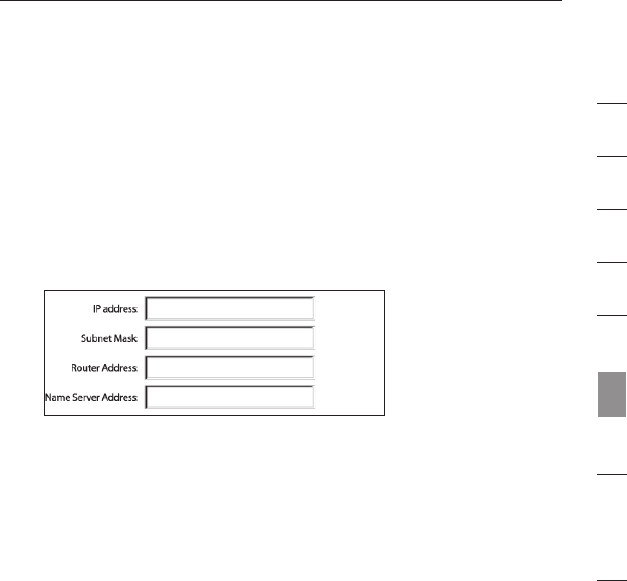
9796
9796
Manually Configuring Network Settings
section
1
9
2
3
4
5
6
7
8
10
4. Select the “TCP/IP” tab (3). Next to “Configure:” (4), you should
see “Manually” or “Using DHCP”. If you do not, check the
PPPoE tab (5) to make sure that “Connect using PPPoE” is NOT
selected. If it is, you will need to configure your Router for a
PPPoE connection type using your user name and password.
5. If “Manually” is selected, your Router will need to be set up for
a static IP connection type. Write the address information in the
table below. You will need to enter this information into
the Router.
6. If not already selected, select “Using DHCP” next to
“Configure:” (4), then click “Apply Now”.
Your network adapter(s) are now configured for use with the Router.
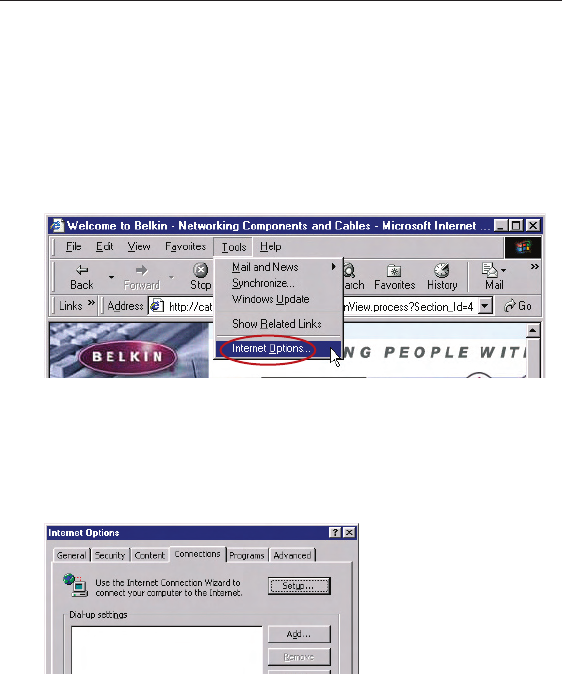
98
Recommended Web Browser Settings
98
In most cases, you will not need to make any changes to your web
browser’s settings. If you are having trouble accessing the Internet or
the Web-Based Advanced User Interface, then change your browser’s
settings to the recommended settings in this section.
Internet Explorer 4.0 or Higher
1. Start your web browser. Select “Tools” then “Internet Options”.
2. In the “Internet Options” screen, there are three selections: “Never
dial a connection”, “Dial whenever a network connection is not
present”, and “Always dial my default connection”. If you can make
a selection, select “Never dial a connection”. If you cannot make a
selection, go to the next step.
3. Under the “Internet Options” screen, click on “Connections” and
select “LAN Settings…”.
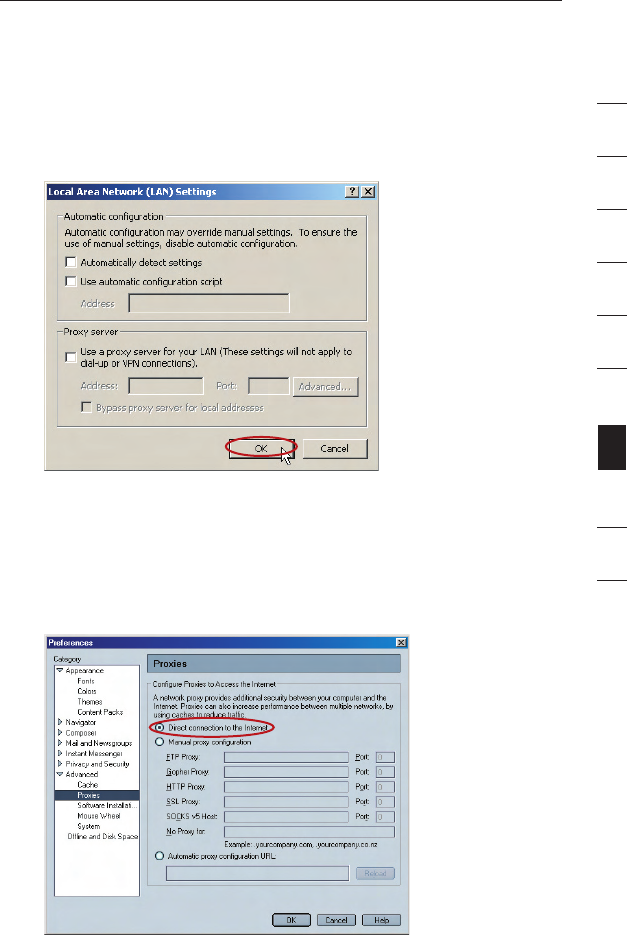
9998
9998
Recommended Web Browser Settings
section
1
9
2
3
4
5
6
7
8
10
4. Make sure there are no check marks next to any of the
displayed options: “Automatically detect settings”, “Use
automatic configuration script”, and “Use a proxy server”. Click
“OK”. Then click “OK” again in the “Internet Options” page.
Netscape® Navigator® 4.0 or Higher
1. Start Netscape. Click on “Edit” then “Preferences”.
2. In the “Preferences” window, click on “Advanced” then select
“Proxies”. In the “Proxies” window, select “Direct connection to
the Internet”.
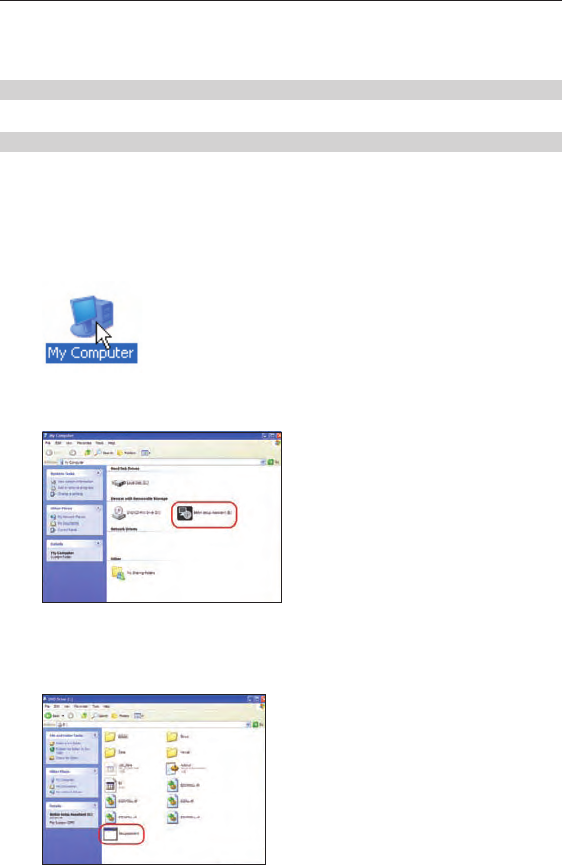
100
Troubleshooting
100
Problem:
Installation CD does not automatically start.
Solution:
If the CD-ROM does not start the Setup Assistant automatically, it
could be that the computer is running other applications that are
interfering with the CD drive.
1. If the Setup Assistant screen does not appear within 15–20
seconds, open up your CD-ROM drive by double-clicking on the
“My Computer” icon that is located on your desktop.
2. Next, double-click on the CD-ROM drive that the Setup Assistant
Software CD has been placed in to start the installation.
3. The Setup Assistant should start within a few seconds. If,
instead, a window appears showing the files on the CD,
double-click on the icon labeled “SetupAssistant.exe”.
4. If the Setup Assistant still does not start, reference the section
titled “Manually Configuring Network Settings” (page 92 of this
User Manual) for an alternate setup method.

101100
101100
Troubleshooting
section
1
9
2
3
4
5
6
7
8
10
Problem:
The Setup Assistant cannot find my Router.
Solution:
If the Setup Assistant is not able to find the Router during the
installation process, please check the following items:
1. If the Setup Assistant is not able to find the Router during the
installation process, there may be third-party firewall software
installed on the computer attempting to access the Internet.
Examples of third-party firewall software are ZoneAlarm,
BlackICE PC Protection, McAfee Personal Firewall, and Norton
Personal Firewall.
If you do have firewall software installed on your computer,
please make sure that you properly configure it. You can
determine if the firewall software is preventing Internet access
by temporarily turning it off. If, while the firewall is disabled,
Internet access works properly, you will need to change the
firewall settings to function properly when it is turned on.
Please refer to the instructions provided by the publisher of your
firewall software for instructions on configuring the firewall to
allow Internet access.
2. Unplug power to the Router for 10 seconds, and then plug the
power back into the Router. Ensure that the Router’s Power light
is on; it should be solid green. If not, check to make sure that
the AC adapter is correctly connected to the Router and plugged
into a wall outlet.
3. Ensure that you have a cable (use the cable included with the
Router) connected between (1) the network (Ethernet) port on the
back of the computer and (2) one of the LAN ports, labeled “1”
through “4”, on the back of the Router.
Note: The computer should NOT be connected to the port labeled
“Internet/WAN” on the back of the Router.
4. Try shutting down and restarting your computer, then rerunning
the Setup Assistant.
If the Setup Assistant is still unable to find the Router, reference
the section titled “Manually Configuring Network Settings” for
installation steps.

102
Troubleshooting
102
Problem:
The Setup Assistant cannot connect my Router to the Internet.
Solution:
If the Setup Assistant is not able to connect the Router to the
Internet, please check the following items:
1. Use the troubleshooting suggestions within the Setup Assistant.
If the troubleshooting screen does not open automatically, click
on the “Troubleshoot” button in the lower, right-hand corner of
the Setup Assistant window.
2. If your ISP requires a user name and password, make sure that
you have typed in your user name and password correctly.
Some user names require that the ISP’s domain be at the
end of the name. Example: “myname@myisp.com”. The “@myisp.
com” part of the user name may need to be typed as well as
your user name.
If you continue to have no Internet connection, reference the
section titled “Manually Configuring Network Settings” (page 92
of this User Manual) for an alternate setup method.
Problem:
• The Setup Assistant completed installation, but my web browser
doesn’t work.
• I am unable to connect to the Internet. The Router’s “WAN” light
is off and the “Connected” light is blinking.
Solution:
If you cannot connect to the Internet, the “WAN” light is off, and the
“Connected” light is blinking, the problem may be that your modem
and Router are not connected properly.
1. Make sure the network cable between the modem and the
Router is connected. We strongly recommend using the cable
that was supplied with your cable or DSL modem for this
purpose. The cable should be connected at one end to the
Router’s “Internet/WAN” port, and at the other end to the
network port on your modem.

103102
103102
Troubleshooting
section
1
9
2
3
4
5
6
7
8
10
2. Unplug the cable or DSL modem from its power source for three
minutes. After three minutes, plug the modem back into its
power source. This may force the modem to properly recognize
the Router.
3. Unplug the power to your Router, wait 10 seconds, and then
reconnect the power. This will cause the Router to reattempt
communication with the modem.
If the “WAN” light on the Router is not lit after completing these
steps, please contact Belkin Technical Support.
4. Try shutting down and restarting your computer.
Problem:
• The Setup Assistant completed installation, but my web browser
doesn’t work.
• I am unable to connect to the Internet. The Router’s “WAN” light
is on and the “Connected” light is blinking.
Solution:
If you cannot connect to the Internet, the “WAN” light is on, and
the “Connected” light is blinking, the problem may be that your
connection type may not match the ISP’s connection.
• If you have a “static IP address” connection, your ISP must
assign you the IP address, subnet mask, and gateway address.
Please refer to the section entitled “Alternate Setup Method” for
details on changing this setting.
• If you have a “PPPoE” connection, your ISP will assign you a
user name and password and sometimes a service name. Make
sure the Router connection type is configured to PPPoE and the
settings are entered properly. Please refer to the section entitled
“Alternate Setup Method” for details on changing this setting.
• You may need to configure your Router to meet the specific
requirements of your ISP. To search our Knowledge Base for
ISP-specific issues, go to: http://web.belkin.com/support and
type in “ISP”.

104
Troubleshooting
104
If you are still unable to access the Internet after verifying these
settings, please contact Belkin Technical Support.
Problem:
• The Setup Assistant completed, but my web browser
doesn’t work.
• I am unable to connect to the Internet. The “WAN” light on my
Router is blinking and the “Connected” light is solid.
Solution:
If the “WAN” light is blinking and the “Connected” light is solid,
but you are unable to access the Internet, there may be third-party
firewall software installed on the computer attempting to access the
Internet. Examples of third-party firewall software are ZoneAlarm,
BlackICE PC Protection, McAfee Personal Firewall, and Norton
Personal Firewall.
If you do have firewall software installed on your computer, please
make sure that you properly configure it. You can determine if the
firewall software is preventing Internet access by temporarily turning
it off. If, while the firewall is disabled and Internet access works
properly, you will need to change the firewall settings to function
properly when it is turned on.
Please refer to the instructions provided by the publisher of your
firewall software for instructions on configuring the firewall to allow
Internet access.
If you are still unable to access the Internet after disabling any
firewall software, please contact Belkin Technical Support.
Problem:
I can’t connect to the Internet wirelessly.
Solution:
If you are unable to connect to the Internet from a wireless
computer, please do the following:
1. Look at the lights on your Router. Your Belkin Router’s lights
should be as follows:
• The “Power” light should be on.
• The “Connected” light should be on and not blinking.
• The “WAN” light should be either on or blinking.

105104
105104
Troubleshooting
section
1
9
2
3
4
5
6
7
8
10
2. Open your wireless utility software by clicking on the icon in the
system tray at the bottom, right-hand corner of the screen. If
you are also using a Belkin Wireless Card or Adapter with this
Router, the tray icon should look like this (the icon may be red
or green):
3. The exact window that opens will vary depending on the model
of wireless card you have; however, any of the utilities should
have a list of “Available Networks”—those wireless networks it
can connect to.
Does the name of your wireless network appear in the results?
Yes, my network name is listed—go to the troubleshooting
solution titled “I can’t connect to the Internet wirelessly, but my
network name is listed”.
No, my network name is not listed—go to the troubleshooting
solution titled “I can’t connect to the Internet wirelessly, and my
network name is not listed”.

106
Troubleshooting
106
Problem:
I can’t connect to the Internet wirelessly, but my network name
is listed.
Solution:
If the name of your network is listed in the “Available Networks” list,
please follow the steps below to connect wirelessly:
1. Click on the correct network name in the “Available
Networks” list.
2. If the network has security (encryption) enabled, you will need to
enter the network key. For more information regarding security,
see the section entitled “Securing your Wi-Fi Network” in this
User Manual.
3. Within a few seconds, the tray icon in the lower, left-hand
corner of your screen should turn green, indicating a successful
connection to the network.
Problem:
I can’t connect to the Internet wirelessly, and my network name is
not listed.
Solution:
If the correct network name is not listed under “Available Networks”
in the wireless configuration utility, please attempt the following
troubleshooting steps:
1. Temporarily move your computer, if possible, five to 10 feet
away from the Router. Close the wireless configuration utility,
and reopen it. If the correct network name now appears under
“Available Networks”, you may have a range or interference
problem. Please see the suggestions discussed in the section
titled “Placement of your Router for Optimal Performance” in this
User Manual.
2. Using a computer that is connected to the Router through a
network cable (as opposed to wirelessly), ensure that “Broadcast
SSID” is enabled. This setting is found on the Router’s wireless
“Channel and SSID” configuration page.
If you are still unable to access the Internet after completing
these steps, please contact Belkin Technical Support.

107106
107106
Troubleshooting
section
1
9
2
3
4
5
6
7
8
10
Problem:
My wireless network performance is inconsistent.
Data transfer is sometimes slow.
Signal strength is poor.
I am having difficulty establishing and/or maintaining a Virtual
Private Network (VPN) connection.
Solution:
Wireless technology is radio-based, which means connectivity and
the throughput performance between devices decreases when the
distance between devices increases. Other factors that will cause signal
degradation (metal is generally the worst culprit) are obstructions such
as walls and metal appliances. As a result, the typical indoor range of
your wireless devices will be between 100 to 200 feet. Note also that
connection speed may decrease as you move farther away from the
Router or access point.
In order to determine if wireless issues are related to range, we suggest
temporarily moving the computer, if possible, five to 10 feet away from the
Router.
Changing the Wireless Channel — Depending on local wireless traffic
and interference, switching the wireless channel of your network can
improve performance and reliability. The default channel the Router is
shipped with is channel 11. You may choose from several other channels
depending on your region (see the section titled “Changing the Wireless
Channel” on page 48 for instructions on how to choose other channels).
Limiting the Wireless Transmit Rate — Limiting the wireless transmit
rate can help improve the maximum wireless range and connection
stability. Most wireless cards have the ability to limit the transmission
rate. To change this property, go to the Windows Control Panel, open
“Network Connections” and double-click on your wireless card’s
connection. In the “Properties” dialog, select the “Configure” button on
the “General” tab (Windows 98 users will have to select the wireless card
in the list box and then click “Properties”), then choose the “Advanced”
tab and select the rate property. Wireless client cards are usually set to
automatically adjust the wireless transmit rate for you, but doing so can
cause periodic disconnects when the wireless signal is too weak; as a
rule, slower transmission rates are more stable. Experiment with different
connection rates until you find the best one for your environment; note
that all available transmission rates should be acceptable for browsing the
Internet. For more assistance, see your wireless card’s user manual.

108
Troubleshooting
108
Problem:
How do I extend the range of my wireless network?
Solution:
Belkin recommends using one of the following products to extend
wireless network coverage throughout large homes or offices:
• Wireless Access Point: A wireless access point can effectively
double the coverage area of your wireless network. An access
point is typically placed in the area not currently covered by your
Wireless G Router, and is connected to the Router using either
an Ethernet cable or through your home’s power lines using two
Powerline Ethernet Adapters.
• For 802.11g (54g™) wireless networks, Belkin offers a Wireless G
Range Extender/Access Point that can be connected wirelessly
to a Belkin Wireless G Router, without requiring an Ethernet
cable or Powerline Ethernet Adapters.
These Belkin products are available at your local retailer, or can be
ordered from Belkin directly.
For network/range extension information, please visit:
www.belkin.com/networking to find out more about:
Wireless G Range Extender/Access Point (F5D7130)
Powerline Ethernet Adapter (F5D4070)
Powerline USB Adapter (F5D4050)

109108
109108
Troubleshooting
section
1
9
2
3
4
5
6
7
8
10
Problem:
I am having difficulty setting up Wired Equivalent Privacy (WEP)
security on a Belkin Wireless Router or Belkin Access Point.
Solution:
1. Log into your Wireless Router or Access Point.
Open your web browser and type in the IP address of the Wireless
Router or Access Point. (The Router’s default is 192.168.2.1, the
Access Point’s default is 192.168.2.254.) Log into your Router by
clicking on the “Login” button in the top, right-hand corner of the
screen. You will be asked to enter your password. If you never set
a password, leave the password field blank and click “Submit”.
Click the “Wireless” tab on the left of your screen. Select
the “Encryption” or “Security” tab to get to the security
settings page.
2. Select “128-bit WEP” from the drop-down menu.
3. After selecting your WEP encryption mode, you can type in
your hex WEP key manually, or you can type in a passphrase
in the “Passphrase” field and click “Generate” to create a WEP
key from the passphrase. Click “Apply Changes” to finish. You
must now set all of your clients to match these settings. A hex
(hexadecimal) key is a combination of numbers and letters from
A–F and 0–9. For 128-bit WEP, you need to enter 26 hex keys.
For example:
C3 03 0F AF 4B B2 C3 D4 4B C3 D4 E7 E4 = 128-bit key
4. Click “Apply Changes” to finish. Encryption in the Wireless
Router is now set. Each of your computers on your wireless
network will now need to be configured with the same
security settings.
WARNING: If you are configuring the Wireless Router or Access
Point from a computer with a wireless client, you will need to ensure
that security is turned on for this wireless client. If this is not done,
you will lose your wireless connection.
Note to Mac users: Original Apple AirPort products support 64-bit
encryption only. Apple AirPort 2 products can support 64-bit or
128-bit encryption. Please check your Apple AirPort product to see
which version you are using. If you cannot configure your network
with 128-bit encryption, try 64-bit encryption.

110
Troubleshooting
110
Problem:
I am having difficulty setting up Wired Equivalent Privacy (WEP)
security on a Belkin client card (Wireless Network Card or Adapter).
Solution:
The client card must use the same key as the Wireless G Router or
access point. For instance, if your Wireless Router or access point
uses the key 00112233445566778899AABBCC, then the client card
must be set to the exact same key.
1. Double-click the “Signal Indicator” icon to bring up the “Wireless
Network Utility” screen. The “Advanced” button will allow you to
view and configure more options of your client card.
2. Once the “Advanced” button is clicked, the Belkin Wireless LAN
Utility will appear. This Utility will allow you to manage all the
advanced features of the Belkin client card.
3. Under the “Wireless Network Properties” tab, select a
network name from the “Available Networks” list and click the
“Properties” button.
4. Under “Data Encryption”, select “WEP”.
5. Ensure the box “The key is provided for me automatically” at
the bottom is unchecked. If you are using this computer to
connect to a corporate network, please consult your network
administrator if this box needs to be checked.
6. Type your WEP key in the “Network key” box.
Important: A WEP key is a combination of numbers and letters
from A–F and 0–
7. For 128-bit WEP, you need to enter 26 keys. This network key
needs to match the key you assign to your Wireless G Router or
access point.
For example:
C3 03 0F AF 4B B2 C3 D4 4B C3 D4 E7 E4 = 128-bit key
8. Click “OK”, and then “Apply” to save the settings.
If you are NOT using a Belkin wireless client card, please consult
the manufacturer’s user manual for that wireless client card.

111110
111110
Troubleshooting
section
1
9
2
3
4
5
6
7
8
10
Problem:
Do Belkin products support WPA?
Solution:
Note: To use WPA security, all your clients must be upgraded to
drivers and software that support it. At the time of this publication,
a security patch download is available, for free, from Microsoft. This
patch works only with the Windows XP operating system.
Download the patch here:
http://www.microsoft.com/downloads/details.
aspx?FamilyID=009d8425-ce2b-47a4-abec-274845dc9e91&displayl
ang=en
You also need to download the latest driver for your Belkin Wireless
802.11g Desktop or Notebook Network Card from the Belkin support
site. Other operating systems are not supported at this time.
Microsoft’s patch only supports devices with WPA-enabled drivers
such as Belkin 802.11g products
Download the latest driver at http://web.belkin.com/support
for the following products:
F5D7000, F5D7001, F5D7010, F5D7011, F5D7230-4,
F5D7231-4, F5D7130

112
Troubleshooting
112
Problem:
I am having difficulty setting up Wi-Fi Protected Access (WPA)
security on a Belkin Wireless Router or Belkin Access Point for a
home network.
Solution:
1. From the “Security Mode” drop-down menu, select “WPA-PSK
(no server)”.
2. For “Encryption Technique”, select “TKIP” or “AES”. This setting
will have to be identical on the clients that you set up.
3. Enter your pre-shared key. This can be from eight to 63
characters and can be letters, numbers, symbols, or spaces.
This same key must be used on all of the clients that you set up.
For example, your PSK might be something like: “Smith family
network key”.
4. Click “Apply Changes” to finish. You must now set all clients to
match these settings.

113112
113112
Troubleshooting
section
1
9
2
3
4
5
6
7
8
10
Problem:
I am having difficulty setting up Wi-Fi Protected Access (WPA)
security on a Belkin client card (Wireless Network Card or Adapter)
for a home network.
Solution:
Clients must use the same key that the Wireless G Router or access
point uses. For instance, if the key is “Smith Family Network Key”
in the Wireless G Router or access point, the clients must also use
that same key.
1. Double-click the “Signal Indicator” icon to bring up the “Wireless
Network Utility” screen. The “Advanced” button will allow you to
view and configure more options of your client card.
2. Once the “Advanced” button is clicked, the Belkin Wireless LAN
Utility will appear. This Utility will allow you to manage all the
advanced features of the Belkin client card.
3. Under the “Wireless Network Properties” tab, select a
network name from the “Available Networks” list and click the
“Properties” button.
4. Under “Network Authentication”, select “WPA-PSK (no server)”.
5. Type your WPA key in the “Network key” box.
Important: WPA-PSK is a combination of numbers and letters
from A–Z and 0–9. For WPA-PSK, you can enter eight to 63
characters. This network key needs to match the key you assign
to your Wireless G Router or access point.
6. Click “OK”, then “Apply” to save the settings.

114
Troubleshooting
114
Problem:
I am having difficulty setting up Wi-Fi Protected Access (WPA)
security on a Belkin client card (Wireless Network Card or Adapter)
for a business.
Solution:
1. Double-click the “Signal Indicator” icon to bring up the “Wireless
Network Utility” screen. The “Advanced” button will allow you to
view and configure more options of your client card.
2. Once the “Advanced” button is clicked, the Belkin Wireless LAN
Utility will appear. This Utility will allow you to manage all the
advanced features of the Belkin client card.
3. Under the “Wireless Network Properties” tab, select a
network name from the “Available Networks” list and click the
“Properties” button.
4. Under “Network Authentication”, select “WPA”.
5. In the “Authentication” tab, select the settings that are indicated
by your network administrator.
6. Click “OK”, then “Apply” to save the settings.
Problem:
I am having difficulty setting up Wi-Fi Protected Access
(WPA) security, and I am NOT using a Belkin client card for
a home network.
Solution:
If you are NOT using a Belkin WPA Wireless Desktop or Wireless
Notebook Network Card and it is not equipped with WPA-enabled
software, a file from Microsoft called “Windows XP Support Patch
for Wireless Protected Access” is available for free download:
http://www.microsoft.com/downloads/search.aspx?displaylang=en
Note: The file that Microsoft has made available works only with
Windows XP. Other operating systems are not supported at this
time. You also need to ensure that the wireless card manufacturer
supports WPA and that you have downloaded and installed the
latest driver from their support site.

115114
115114
Troubleshooting
section
1
9
2
3
4
5
6
7
8
10
Supported Operating Systems:
• Windows XP Professional
• Windows XP Home Edition
Enabling WPA-PSK (no server)
1. In systems running Windows XP, click “Start > Control Panel >
Network Connections”.
2. Right-click on the “Wireless Networks” tab. The “Wireless Network
Connection Properties” screen appears. Ensure the “Use Windows to
configure my wireless network settings” box
is checked.
3. Under the “Wireless Networks” tab, click the “Configure” button,
and you will see the client card properties screen.
4. For a home or small business user, select “WPA-PSK” under
“Network Administration”.
5. Select “TKIP” or “AES” under “Data Encryption”. This setting will
have to be identical to the Wireless G Router or access point
that you set up.
6. Type your encryption key in the “Network key” box.
Important: Enter your pre-shared key. This can be from eight to 63
characters and can be letters, numbers, or symbols. This same key
must be used on all of the clients that you set up.
7. Click “OK” to apply settings.

116
Troubleshooting
116
What’s the difference between 802.11b, 802.11g, 802.11a, and
draft 802.11n?
Currently there are four levels of wireless networking standards,
which transmit data at very different maximum speeds. Each is
based on the designation for certifying network standards. The
most common wireless networking standard, 802.11b, transmits
information at 11Mbps; 802.11a and 802.11g work at 54Mbps; and draft
802.11n works at 108Mbps. See the chart on the next page for more
detailed information.

117116
117116
Troubleshooting
section
1
9
2
3
4
5
6
7
8
10
Wireless Comparison Chart
Wireless
Technology
802.11b
G
(802.11g)
G Plus
(802.11g with
HSM)
G Plus MIMO
(802.11g with
MIMO MRC)
N1 MIMO
(draft 802.11n
with MIMO)
Speed*
11Mbps link
rate/baseline
5x faster than
802.11b*
10x faster
than 802.11b*
10x faster than
802.11b*
Wired speed
over the air*
Frequency
Common
household
devices such
as cordless
phones and
microwave
ovens may
interfere with
the unlicensed
band 2.4GHz
Common
household
devices such
as cordless
phones and
microwave
ovens may
interfere with
the unlicensed
band 2.4GHz
Common
household
devices such
as cordless
phones and
microwave
ovens may
interfere with
the unlicensed
band 2.4GHz
Common
household
devices such
as cordless
phones and
microwave
ovens may
interfere with
the unlicensed
band 2.4GHz
Common
household
devices such
as cordless
phones and
microwave
ovens may
interfere with
the unlicensed
band 2.4GHz
Compatibility
Compatible
with 802.11g
Compatible
with 802.11b/g
Compatible
with 802.11b/g
Compatible
with 802.11b/g
Compatible
with draft
802.11n** and
802.11b/g
Coverage*
Typically
100–200 ft.
indoors
Up to 400 ft.* Up to 700 ft.* Up to 1,000 ft.* Up to 1,400 ft.*
Advantage
Mature—legacy
technology
Common—
widespread
use for Internet
sharing
Enhanced
speed and
coverage
Better coverage
and consistent
speed at range
Leading
edge—best
coverage and
throughput
*Distance and connection speeds will vary depending on your
networking environment.

118
Troubleshooting
118
Technical Support
You can find technical support information at http://www.belkin.com/
networking or www.belkin.com through the tech support area. If you
want to contact technical support by phone, please call:
US: 877-736-5771
800-223-5546 ext. 2263
310-898-1100 ext. 2263
UK: 0845 607 77 87
Australia: 1800 235 546
New Zealand: 0800 235 546
Singapore: 65 64857620
Europe: www.belkin.com/support
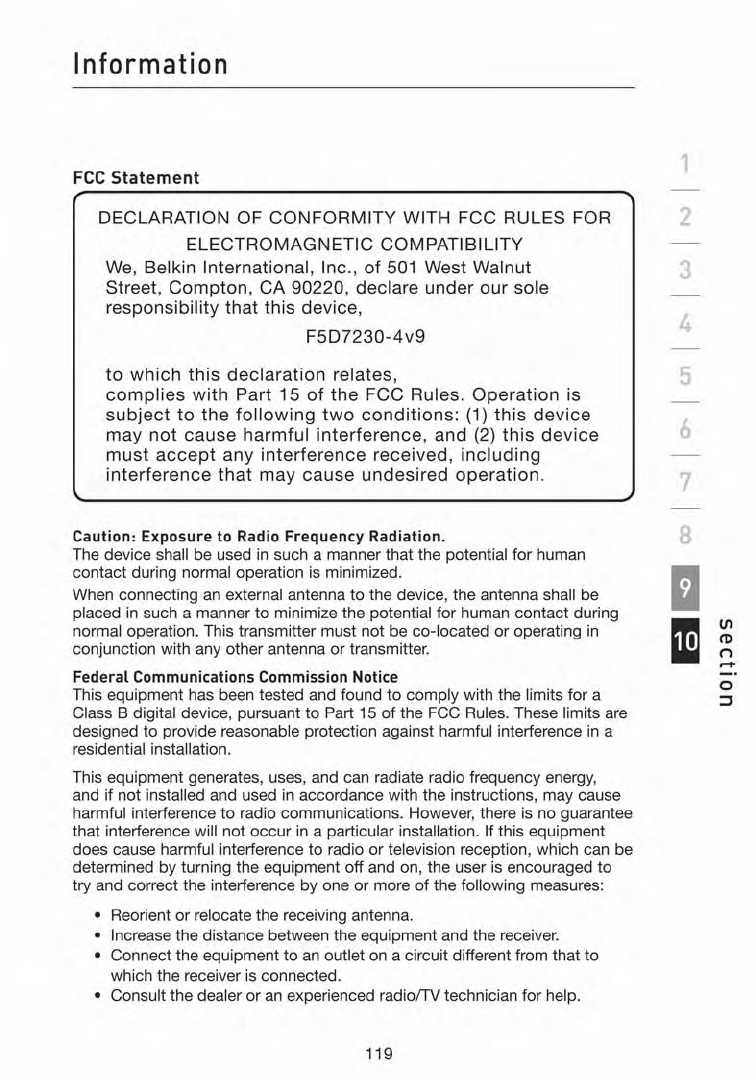

120
Information
120
FCC Caution: Any changes or modifications not expressly approved by the
party responsible for compliance could void the user’s authority to operate this
equipment.
IMPORTANT NOTE:
FCC Radiation Exposure Statement:
This equipment complies with FCC radiation exposure limits set forth for an
uncontrolled environment. This equipment should be installed and operated
with a minimum distance of 20cm between the radiator and your body.
This transmitter must not be co-located or operating in conjunction with any
other antenna or transmitter.
2.4GHz operation of this product in the USA is firmware-limited to channels 1
through 11.
Modifications
The FCC requires the user to be notified that any changes or modifications to
this device that are not expressly approved by Belkin International, Inc., may
void the user’s authority to operate the equipment.
Canada-Industry Canada (IC)
The wireless radio of this device complies with RSS 210 Industry Canada. This
Class B digital apparatus complies with Canadian ICES-003.
Operation is subject to the following two conditions:
1) this device may not cause interference, and
2) this device must accept any interference, including interference that may
cause undesired operation of the device.
IMPORTANT NOTE:
IC Radiation Exposure Statement:
This equipment complies with Canada radiation exposure limits set forth for
uncontrolled environments. This equipment should be installed and operated with a
minimum distance of 20cm between the radiator and your body.
This transmitter must not be co-located or operating in conjunction with any other
antenna or transmitter.
Cet appareil numérique de la classe B conforme á la norme NMB-003 du Canada.

121120
121120
Information
section
1
9
2
3
4
5
6
7
8
10
Europe-European Union Notice
Radio products with the CE 0682 or CE alert marking comply with the R&TTE
Directive (1995/5/EC) issued by the Commission of the European Community.
Compliance with this directive implies conformity to the following European
Norms (in parentheses are the equivalent international standards).
• EN 60950-1 (IEC60950) – Product Safety
• EN 300 328—Technical requirement for radio equipment
• EN 301 489—General EMC requirements for radio equipment.
To determine the type of transmitter, check the identification label on
your Belkin product.
Products with the CE marking comply with the EMC Directive
(89/336/EEC) and the Low Voltage Directive (72/23/EEC) issued
by the Commission of the European Community. Compliance with
these directives implies conformity to the following European Norms
(in parentheses are the equivalent international standards).
• EN 55022 (CISPR 22) – Electromagnetic Interference
• EN 55024 (IEC61000-4-2,3,4,5,6,8,11) – Electromagnetic Immunity
• EN 61000-3-2 (IEC610000-3-2) – Power Line Harmonics
• EN 61000-3-3 (IEC610000) – Power Line Flicker
• EN 60950-1 (IEC60950) – Product Safety
Products that contain the radio transmitter are labeled with CE 0682 or CE
alert marking and may also carry the CE logo.

122
Information
122
Belkin International, Inc., Limited Lifetime Product Warranty
What this warranty covers.
Belkin International, Inc. (“Belkin”) warrants to the original purchaser of this Belkin
product that the product shall be free of defects in design, assembly, material,
or workmanship.
What the period of coverage is.
Belkin warrants the Belkin product for the lifetime of the product.
What will we do to correct problems?
Product Warranty.
Belkin will repair or replace, at its option, any defective product free of charge
(except for shipping charges for the product).
What is not covered by this warranty?
All above warranties are null and void if the Belkin product is not provided
to Belkin for inspection upon Belkin’s request at the sole expense of
the purchaser, or if Belkin determines that the Belkin product has been
improperly installed, altered in any way, or tampered with. The Belkin Product
Warranty does not protect against acts of God such as flood, lightning,
earthquake, war, vandalism, theft, normal-use wear and tear, erosion,
depletion, obsolescence, abuse, damage due to low voltage disturbances
(i.e. brownouts or sags), non-authorized program, or system equipment
modification or alteration.
How to get service.
To get service for your Belkin product you must take the following steps:
1. Contact Belkin International, Inc., at 501 W. Walnut St., Compton, CA
90220, Attn: Customer Service, or call (800)-223-5546, within 15 days of
the Occurrence. Be prepared to provide the following information:
a. The part number of the Belkin product.
b. Where you purchased the product.
c. When you purchased the product.
d. Copy of original receipt.
2. Your Belkin Customer Service Representative will then instruct you on
how to forward your receipt and Belkin product and how to proceed
with your claim.

123122
123122
Information
section
1
9
2
3
4
5
6
7
8
10
Belkin reserves the right to review the damaged Belkin product. All costs of
shipping the Belkin product to Belkin for inspection shall be borne solely by
the purchaser. If Belkin determines, in its sole discretion, that it is impractical
to ship the damaged equipment to Belkin, Belkin may designate, in its sole
discretion, an equipment repair facility to inspect and estimate the cost to
repair such equipment. The cost, if any, of shipping the equipment to and
from such repair facility and of such estimate shall be borne solely by the
purchaser. Damaged equipment must remain available for inspection until the
claim is finalized. Whenever claims are settled, Belkin reserves the right to be
subrogated under any existing insurance policies the purchaser may have.
How state law relates to the warranty.
THIS WARRANTY CONTAINS THE SOLE WARRANTY OF BELKIN. THERE
ARE NO OTHER WARRANTIES, EXPRESSED OR, EXCEPT AS REQUIRED
BY LAW, IMPLIED, INCLUDING THE IMPLIED WARRANTY OR CONDITION
OF QUALITY, MERCHANTABILITY OR FITNESS FOR A PARTICULAR
PURPOSE, AND SUCH IMPLIED WARRANTIES, IF ANY, ARE LIMITED IN
DURATION TO THE TERM OF THIS WARRANTY.
Some states do not allow limitations on how long an implied warranty lasts,
so the above limitations may not apply to you.
IN NO EVENT SHALL BELKIN BE LIABLE FOR INCIDENTAL, SPECIAL,
DIRECT, INDIRECT, CONSEQUENTIAL OR MULTIPLE DAMAGES SUCH AS,
BUT NOT LIMITED TO, LOST BUSINESS OR PROFITS ARISING OUT OF
THE SALE OR USE OF ANY BELKIN PRODUCT, EVEN IF ADVISED OF THE
POSSIBILITY OF SUCH DAMAGES.
This warranty gives you specific legal rights, and you may also have other
rights, which may vary from state to state. Some states do not allow the
exclusion or limitation of incidental, consequential, or other damages, so the
above limitations may not apply to you.

Belkin Ltd.
4 Pioneer Avenue
Tuggerah Business Park
Tuggerah, NSW 2259, Australia
+61 (0) 2 4350 4600
+61 (0) 2 4350 4700 fax
Belkin B.V.
Boeing Avenue 333
1119 PH Schiphol-Rijk, The Netherlands
+31 (0) 20 654 7300
+31 (0) 20 654 7349 fax
Belkin Tech Support
US: 877-736-5771
800-223-5546 ext. 2263
310-898-1100 ext. 2263
UK: 0845 607 77 87
Australia: 1800 235 546
New Zealand: 0800 235 546
Singapore: 65 64857620
Europe: www.belkin.com/support
Belkin International, Inc.
501 West Walnut Street
Los Angeles, CA 90220, USA
310-898-1100
310-898-1111 fax
Belkin Ltd.
Express Business Park
Shipton Way, Rushden
NN10 6GL, United Kingdom
+44 (0) 1933 35 2000
+44 (0) 1933 31 2000 fax
© 2008 Belkin International, Inc. All rights reserved. All trade names are registered trademarks of respective
manufacturers listed. Apple, AirPort, Mac, Mac OS, and AppleTalk are trademarks of Apple Inc., registered in
the U.S. and other countries. Windows, Windows Vista, NT, and Microsoft are either registered trademarks
or trademarks of Microsoft Corporation in the United States and/or other countries. P74559-G
Wireless G
Router